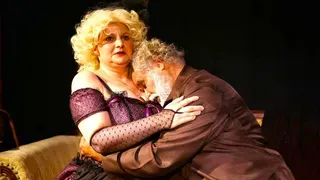August 18, 2008
The Kurt Weill Project
Robert Nesti READ TIME: 2 MIN.
It would be curious to think what Kurt Weill might have thought of A. J. Teshin's ambitious The Kurt Weill Project, which puts a 21st century spin on the 20th century's most ambitious musical theater composer. Weill, who died at the age of 50 more than a half-century ago, was unique amongst his musical theater contemporaries in that he orchestrated his scores, which included such titles as "The Threepenny Opera," "Rise and Fall of the City of Mahagonny," "Lady in the Dark," and "Street Scene," giving them a highly characteristic sound - like the musical equivalent of Sweet Tarts. How does it adapt to one that doesn't use an orchestra at all, rather one as heavily synthesized and layered as Teshin presents on this CD?
Certainly Weill has been given a contemporary spin before, most notably with the CD "Lost In The Stars," which offered numerous pop and rock artists tackling Weill standards. Teshin's approach, though, is different - more a soundscape than a recital, moving between Weill's various periods of songwriting (German, French and English) with considerable finesse. Teshin may lack the dramatic power of Uta Lemper or the vocal fullness of Thomas Hampson (both of whom have excellent Weill collections in the catalogue); but this isn't a traditional setting. Rather the approach is to give Weill a modern sound, one that flavors the songs with ambient textures.
Teshin's tenor can be lovely, especially in the lilting tango "Je Ne T'aime Pas," but sometimes he comes across as a struggling cabaret artist, most notably with the opening "Lonely House," which lacks much distinction despite the sonic pyrotechnics that accompany his vocal. Those electronic techniques, though, make for lively listening throughout, most notably in the haunting "Le Train du Ciel" and his imaginative take on "The Alabama Song," which underscores the song's seedy, desperate sexual subtext. He can be a tease - why only an instrumental taste of "Ballad-Tango" (from "Threepenny")? And snarky, as in dropping a line from "The Ladies Who Lunch" in irony-laden "The Ballad of the Soldier's Wife."
He wisely ends the CD with two of Weill's loveliest creations - a "Speak Low" that's a sonic wonderland and a plaintiff version of "It Never Was You," one of Weill's loveliest American songs that is performed with only piano accompaniment. Though why the CD release doesn't include the 'Surabaya Johnny" that can be downloaded from iTunes is annoying - the CD isn't very long to begin with and it would be interesting to hear Teshin's version of that highly dramatic song. Nonetheless those who love Weill, as well as those who may not know anything about him, will likely find much to admire in this innovative set by a young singer worth watching.
Robert Nesti can be reached at [email protected].







